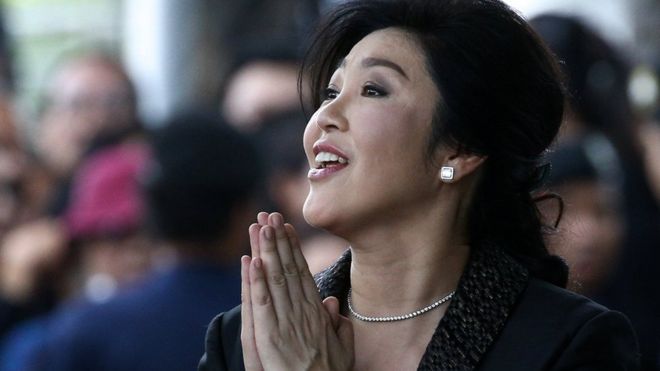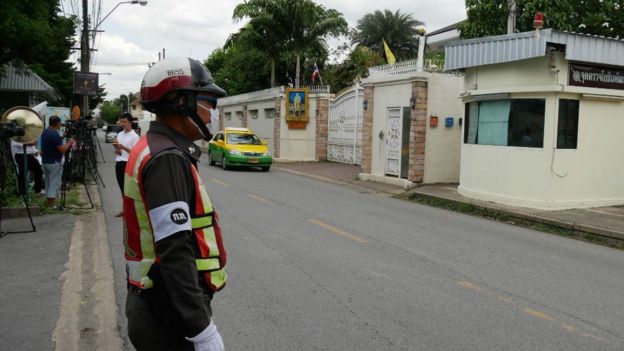Sources in her party say she made the decision to leave unexpectedly, shortly before she was due to appear at the Supreme Court on negligence charges.
Her lawyers told the court she had been unable to attend because she was ill.
But when she failed to appear, the court issued an arrest warrant for her and confiscated her bail.
Judges also postponed the verdict until 27 September.
Ms Yingluck has denied any wrongdoing in the scheme which cost Thailand billions of dollars. If found guilty at the end of her two-year trial, she could be jailed for up to 10 years and permanently banned from politics.
Sources within Ms Yingluck's Puea Thai Party told Reuters that she had "definitely left Thailand" but did not give details of her whereabouts.
Thailand on edge for Yingluck trial verdict
Profile: Yingluck Shinawatra
Earlier, Prime Minister Prayuth Chan-ocha said all routes out of the country were being closely monitored.
"I just learned that she did not show up [at court]," he told reporters. "I have ordered border checkpoints to be stepped up."
How could Yingluck Shinawatra have left?
However, it is a poorly-concealed secret that some in the military government would have been happy to see her leave the country before the verdict.
Had she been convicted and jailed, she could have been seen as a victim by her supporters. The government was nervous about their reaction. Acquitting her, though, would have been equally unacceptable to her hard-line opponents, many of them very influential.
That would also have undermined the justification for the military coup which overthrew her government. So it is unlikely anyone tried to stop her leaving, or that they will try to get her back.
She could have gone to the VIP area of one of Bangkok's airports and taken a private jet out of the country or she might have driven across the border into Cambodia or Laos.
However she is most likely to have joined her brother, Thaksin Shinawatra, who has been living mainly in Dubai since he went into exile, fleeing a Supreme Court verdict, in 2008.
Deputy PM Prawit Wongsuwan initially said he had no information on Ms Yingluck's whereabouts but as he left a meeting in Bangkok he said: "It is possible that she has fled already."
Ms Yingluck's lawyer had requested a delay in the ruling, telling the Supreme Court that she had vertigo and a severe headache and was unable to attend.
But the court said in a statement it did not believe she was sick as there was no medical certificate and that the claimed sickness was not severe enough that she could not travel to court.
"Such behaviour convincingly shows that she is a flight risk. As a result, the court has issued an arrest warrant and confiscated the posted bail money," the statement said.
In another development, a former Thai minister also charged in connection with the rice subsidy scheme was jailed for 42 years on Friday.
Boonsong Teriyapirom was found guilty of falsifying rice deals between Thailand and China.
Timeline of Yingluck's rice scheme controversy
May 2011- Yingluck Shinawatra is elected PM, and shortly afterwards begins rolling out her rice subsidy scheme.
January 2014 - Thailand's anti-corruption authorities investigate Ms Yingluck in connection to the scheme.
May 2014 - She is forced to step down from her post after Thailand's constitutional court finds her guilty of abuse of power in another case. Weeks later the military ousts what remains of her government.
January 2015 - An army-backed legislature impeaches Ms Yingluck for corruption over her role in the rice scheme, which effectively bans her from politics for five years. It also launches legal proceedings against her.
August 2017 - Ms Yingluck fails to appear at court for the verdict, claiming ill health.








No comments: